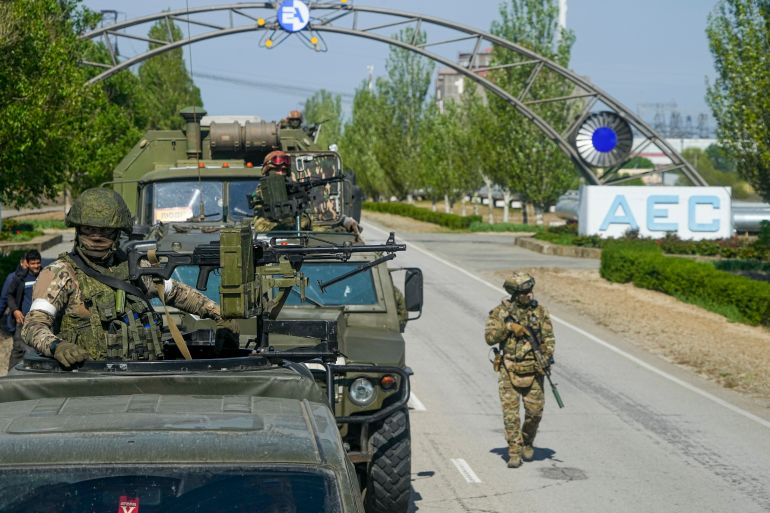UN chief repeats call for military withdrawals from Zaporizhzhia
Antonio Guterres warns potential damage to facility in southern Ukraine would be ‘suicide’ as Zelenskyy agrees to terms for IAEA visit.

UN chief Antonio Guterres has warned any potential damage to the Zaporizhzhia nuclear power station, Europe’s biggest, would be “suicide” as he and the presidents of Turkey and Ukraine discussed ways to secure the plant, and Ukraine’s president agreed to parameters for a potential visit to the facility.
Speaking in Lviv in western Ukraine, Guterres told the media he was “gravely concerned” at the situation around the facility that has seen repeated shelling in recent weeks.
Keep reading
list of 3 itemsCrimea ‘sabotage’ highlights Russia’s woes in Ukraine war
Russia, West vie for influence amid Africa caution on Ukraine war
“Military equipment and personnel should be withdrawn from the plant. Further deployment of forces or equipment to the site must be avoided. The area needs to be demilitarised,” said Guterres, who is on his second visit to the country since the Russian invasion in February.
“We must tell it like it is — any potential damage to Zaporizhzhia is suicide.”
The UN secretary-general, Ukrainian President Volodymyr Zelenskyy and Turkey’s President Recep Tayyip Erdogan were meeting amid growing fears of a nuclear catastrophe over the repeated shelling of the plant.
Following the meeting, Zelenskyy said he had agreed to the parameters of a potential mission to Zaporizhzhia by the International Atomic Energy Agency (IAEA) and echoed Guterres’s call for demilitarisation.
“Only absolute transparency and control of the situation” by the IAEA, among other bodies, could guarantee nuclear safety, he said.
It was not immediately clear if Russia would agree to the parameters.
Russia had earlier rejected as “unacceptable” international calls for a demilitarised zone at the facility, which was captured by Russian troops early in the war but continues to be operated by Ukrainian civilians.
Concerns about the plant mounted on Thursday when Russian and Ukrainian authorities accused each other of plotting to attack the site and then blame the other side.
Kyiv and Moscow have traded accusations about multiple recent incidents of shelling at Zaporizhzhia.
“We don’t want another Chernobyl,” Erdogan said.
IAEA chief Rafael Mariano Grossi has repeatedly called on Moscow and Kyiv to cooperate in order to allow his agency to assess the plant’s safety.
Erdogan backs negotiations to end war
The meeting in Lviv is seen as an opportunity for the UN and Turkey to begin testing the waters about the possibility of a negotiated settlement between Kyiv and Moscow.
Erdogan, who was on his first visit to Ukraine since Russia invaded on February 24, insisted the war should be resolved through diplomatic channels and renewed his offer to act as a mediator.
“We are ready to act as a facilitator or mediator towards the goal of reviving the negotiations,” he said. “What matters is to find the shortest and fairest way to the negotiating table.”
Zelenskyy ruled out peace with Russia unless it withdraws its troops from Ukraine.
Zelenskyy told reporters he was “very surprised” to hear from Erdogan that Russia was “ready for some kind of peace”, adding, “First, they should leave our territory and then we’ll see.”
Boosting grain exports before northern winter
Thursday’s talks, held near the Polish border, also addressed pressing concerns about the global food crisis triggered by the disruption of grain exports from Ukraine.
Developing countries have been hit particularly hard by shortages and high prices, and the UN has declared several African nations in danger of famine.
Guterres touted the success of a deal between Ukraine and Russia, brokered by Turkey and the UN, that led to exports resuming this month. However, he added that it would take time before its effects would be felt by “people at their local bakery and in their markets”.
“We will do our best to scale up our operations to face … the coming winter,” Guterres said.
Erdogan revealed they discussed the exchange of prisoners of war between Ukraine and Russia and said he planned to raise the issue with Russian President Vladimir Putin.
NATO-member Turkey has maintained good relations with Russia — an important trade partner — and has sought to mediate in the conflict, which has descended into a drawn-out of war of attrition focused mainly in Ukraine’s south and east.
“We attach great importance to this issue … of what happened to the exchange of these captives,” Erdogan said.
Earlier this month, Guterres launched a fact-finding mission into an incident in the front-line Ukrainian town of Olenivka in which prisoners held by Moscow-backed separatists were killed.
Russia and Ukraine both requested an investigation.
Guterres said that the terms for the mission and the make up of the team had been shared with Russia and Ukraine, which both need to agree to it. He said he intended to appoint Brazilian General Carlos dos Santos Cruz to lead the inquiry.